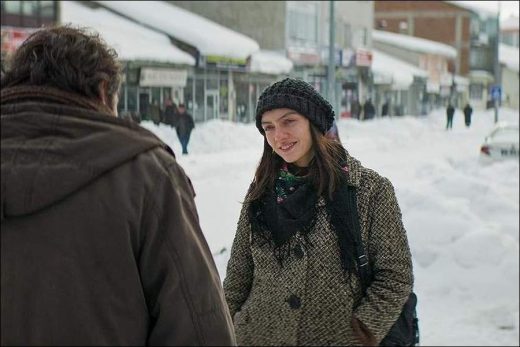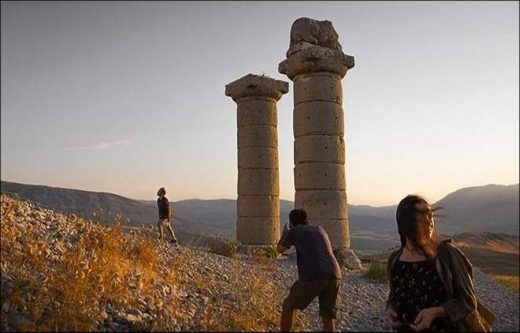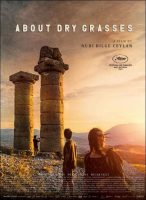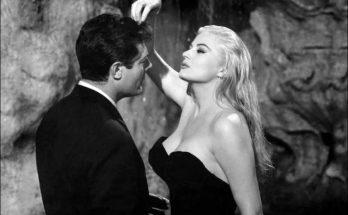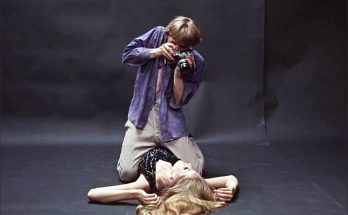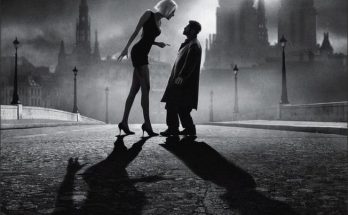About Dry Grasses movie review. At nearly 200 minutes in length, “About Dry Grasses” (or “Kuru Otlar Üstüne”) is par for the course for Turkish virtuoso Nuri Bilge Ceylan. He returns, once again, to the icy frost of his Anatolia-set Palme d’Or winner “Winter Sleep,” for a story that beats with similar frustrations towards power in the grand social scheme. However, he weaves this theme into his background tapestry, favoring instead a talkative and often discomforting tale of a small-town art teacher, his 12-year-old female student, and an accusation of impropriety that might be false on its surface, but is rooted in truths the camera sees.
Where “Winter Sleep” adapted Russian greats like Chekhov and Dostoyevsky — it draws from both “The Wife” and “The Brothers Karamazov”— “About Dry Grasses” plays like a spiritual descendant of Nabokov’s “Lolita,” at least in its use of point-of-view. Ceylan’s novelistic approach to cinema could perhaps find no more fitting a partner than Nabokov’s lyricism, the kind that is at once cinematic in spirit, and yet wholly difficult to adapt for the screen.
Ceylan’s latest takes a similarly imaginative, poetic approach to everything from the dull and mundane to the downright sordid, filtering a distasteful story of a man beset by rural frustrations through a surprisingly personal lens, one that keeps things frequently intriguing, occasionally electric, and altogether challenging. It’s only toward the very end of the movie’s 3 hours and 17 minutes that one feels the weight of its running time, by which point anything approaching emotional oppressiveness becomes added emphasis — an exclamation point at the end of its protagonist’s narcissistic screed.
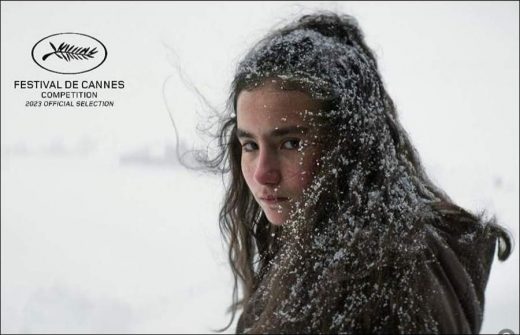
The first image we see emerging from the empty, frigid white backdrop is Samet (Deniz Celiloğlu), a middle-aged art instructor and part-time photographer making his way across what feels like a rural wasteland, to begin his fourth year of compulsory residence teaching rural eighth graders in the dead of winter.
He comes off, at first, like a pleasant, personable, and new-ish (though not quite “new”) addition to the roster of teachers who have been around much longer than he has, including his housemate Kenan (Musab Ekici). Like several of the other faculty, they live in one of the tiny buildings scattered around the school, while the students pour in from nearby townships in Eastern Anatolia. One student, the lively, boisterous Sevim (Ece Bağcı), is Samet’s clear favorite, between the gifts he secretly gives her, and the fact that he only calls on her and her closest friends to answer questions in class. If other students dare to point this out, he responds unkindly.
As Sevim, Bağcı is shouldered with the immense challenge of both playing Samet’s bubbly and eerily two-dimensional conception of her, as well as a more nuanced and realistic performance the camera captures in fleeting hints, in the rare moments that depict the psychological impact of their dynamic, away from Samet’s presence. It’s a mesmerizing performance from such a young actress, made all the more stunning by her interplay with Celiloğlu, who whips from charming to fiery and fearsome at a moment’s notice. However, just as cinematically intriguing is the way Celiloğlu reins in this part of Samet after letting it fly off the handle, reeling it in and making it a newfound part of the character’s personality, as if each ferocious outburst had added a hint of color to his complexion.
Ceylan’s interest lies not in crafting the kind of film where a teacher outright crosses several lines, but the kind that floats cautiously along those lines as Samet seems to blur them. As much as “About Dry Grasses” remains plot-driven in its first half — the length of an average feature film to begin with — it’s also a detailed portrait of the kind of person able to skillfully manipulate those around him, while maintaining a safe level of deniability.
In that aforementioned first half, a roundabout accusation is delivered to Samet through third and fourth parties. He isn’t familiar with what he’s being accused of, but he fearfully suspects his pet student may be somehow involved, and he adjusts his behavior towards her accordingly, punishing her and playing the victim, thus providing a window into the kind of woe-is-me self-pity that a character of his fragile temperament might immediately turn to.
However, Ceylan isn’t satisfied with containing Samet and his existence to this specific scenario. After all, the lives of predators and victims (and people in general) don’t stop once an accusation arises. From that point on, just as much of the film is about his and Kenan’s friendship with an English teacher at a nearby school, Nuray (Merve Dizdar), and the way Samet perceives their triangular dynamic. Whether or not Samet is a groomer, the tendencies he displays must surely manifest elsewhere, in different and more socially acceptable ways — what might that look like?
Ceylan is a master of the lengthy, languid take, wherein the camera’s steady and suppressed energy — in wide or medium shots — allows for a skillful and often precise build to moments of passionate exchange. The length of his shots, going on for several minutes at a time, affords each character the chance to create a world unto themselves, an opportunity of which Samet undoubtedly avails.
However, the worlds that clearly exist in the lives of Nuray, Sevim, Kenan, and so forth are worlds to which the camera does not have access. It sees hints of other people, but remains trapped by Samet’s purview, one that takes even Ceylan’s fully-realized aesthetic oscillations — few filmmakers are better at imbuing the frame with enormity and intensity by suddenly moving their camera, or cutting quickly from oblique wide shots to stunningly composed, head-on close ups — and turns them into stylistic capitulations, as if the film’s very fabric were warping around Samet’s ability to move through the world as he deems fit.
Of course, Samet is but an extension of Ceylan (and of his wife and co-writer Ebru Ceylan, and their fellow writing partner Akın Aksu). Ceylan’s previous works have long featured small-town figures and artists moving to big cities — a reflection of his own story — but Samet is a former resident of Istanbul, and the frustrations that inform his uncaring actions are born at least in part from having had to move away from what he calls “civilization,” and to a place and people he loathes. Even the intimacy he’s able to forge with other people ends up wielded like a weapon, and so “About Dry Grasses” can’t help but feel like Ceylan asking what might become of him if he, and not some hypothetical person, were thrust into these circumstances.
Like Ceylan, Samet’s keen eye for still photography is central to his outlook, and the movie takes frequent detours into photo-essay territory, depicting the way he captures the world around him. The narrative is so tethered to his perspective, despite its occasional hints of a wider physical and emotional world, that at one point, it all but loops back on itself in order to expose its own artifice — a tongue-in-cheek depiction of the way Samet cloaks and conceals himself around other people, even in moments that seem genuine and generous. The film positions even the creation of images as an act of narcissism — introspection in the form of scathing self-critique — but an act through which fears and frustrations can be easily found, and easily felt.
To call a work such as this “self-indulgent” would be nothing if not a compliment, for it embodies the human tendencies of self-indulgence in a way few others have in recent memory — not the indulgence of wealth or luxurious opulence, but the indulgences that exist despite their absence, in towns like the one in which Samet reluctantly finds himself. It’s about the indulgences of power in minor and corrosive ways, enacted even by characters whose depth and richness spreads across the screen in vivid hues.
Ceylan’s is the cinema of what’s seen, as well as the cinema of what one of the film’s own characters rightly calls “beyond the visible,” when discussing his thoughts on memory and religion. Your mileage may vary, but “About Dry Grasses” is among the most brilliantly off-putting works to be featured at Cannes in recent years, with so rotten a core that every hint of virtue or even normalcy in the camera’s peripheral vision becomes a tragedy unto itself, simply by way of being ignored.
All about About Dry Grasses movie.
About Dry Grasses (2023)
Kuru Otlar Üstüne
Directed by: Nuri Bilge Ceylan
Starring: Deniz Celiloğlu, Merve Dizdar, Musab Ekici, Ece Bağcı, Erdem Şenocak, Münir Can Cindoruk, Onur Berk Arslanoğlu, Elif Ürse, Elit Andaç, Nalan Kuruçim, Eylem Canpolat
Screenplay by: Nuri Bilge Ceylan, Ebru Ceylan, Akın Aksu
Production Design by: Meral Aktan
Cinematography by: Kürşat Üresin, Cevahir Şahin
Film Editing by: Nuri Bilge Ceylan, Oğuz Atabaş
Costume Design by: Gülsah Yüksel
Art Direction by: Meral Aktan
Music by: Philip Timofeyev
MPAA Rating: None.
Distributed by: Memento Distribution (France)
Release Date: May 2023 19, (Cannes), July 12, 2023 (France), September 29, 2023 (Turkey)
Visits: 32
